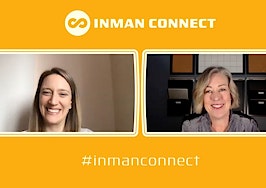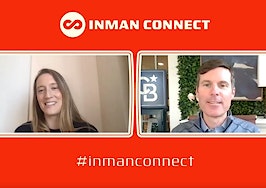Coldwell Banker was on the move even before the coronavirus pandemic changed everything.
All the way back in early 2019, the company — which was founded more than a century ago — unveiled a new, digital-friendly logo and rebranding effort. Later that year, the firm’s parent Realogy launched an ambitious agent healthcare program that first became available in company-owned Coldwell Banker offices. And in February of 2020, the firm launched a new program to boost diversity among its franchisees.
It’s no surprise, then, that Coldwell Banker thrived when 2020 got crazy and COVID-19 turned everything on its head. In November, for example, CEO M. Ryan Gorman revealed that he was seeing brisk sales across the country. A few months earlier, Coldwell Banker rolled out a slew of new technology tools, and weeks before that welcomed three brokerages to its diversity program.
All of these things matter because everything that Coldwell Banker does matters. The real estate industry may be more competitive than ever, but Coldwell Banker stands alone for its age, size and as the crown jewel in the Realogy family.
Still, none of that means Coldwell Banker can — or wants to — rest on its laurels. To better understand what opportunities and challenges the brand will face in the coming months, Inman reached out both to Gorman and to industry observers who have been watching Coldwell Banker’s evolution. The takeaway from these conversations is that the company has a unique cachet thanks to its age and historic clout, but that it will also have to work extra hard to stay relevant in a time when consumers prioritize speed and ease over tradition.
Here are five things to watch as Coldwell Banker navigates 2021:
Growth
In a conversation with Inman, Gorman explained that one of the most important components of Coldwell Banker’s 2021 strategy is growth. That includes both adding agents and expanding the company’s footprint, as well as helping agents rise above what ultimately proved in many cases to be a profitable 2020.

Ryan Gorman
“The theme is really growth,” Gorman said. “I want every single agent to focus on outperforming themselves, on turning last year’s ceiling into this year’s floor.”
Gorman said his company has a few strategies to make that happen. To help agents and brokers themselves grow their business, for example, Coldwell Banker is providing an array of training and coaching opportunities, and Gorman himself is spending time advising members of the company. Additionally, Coldwell Banker sent Inman data indicating that agents who participated in training courses such as Coldwell Banker University and Achieve Maximum Productivity (AMP) have seen their sales and volume go up. Such programs will be a key part of growth in the near future.
And of course, Coldwell Banker has made recent investments in technology. Gorman added that he sees 2021 as a period in which the brand will continue beefing up its existing tech offerings.
“2021 is not going to be a year of massive change but of continuous, dogged improvement of everything we have on offer,” Gorman added.
In terms of growing the brand, Coldwell Banker hopes to attract both experienced and new agents. The company has already had some success on that front, with a spokesperson telling Inman that in 2020, 16,000 agents joined the company. Those agents came both from other industries, as well as from other brokerages.
Gorman said his company is aware that at this particular moment in time a lot of people may be considering jobs in real estate for the first time, and added that he’d like to attract those would-be agents.
Coldwell Banker clearly already has had some success on this front, and Gorman also noted that the company’s research indicates exceptionally high levels of satisfaction among agents.
But outside observers also argued the company will have to be smart if it really wants to grow.

Eric Stegemann
Eric Stegemann was among them. Today, Stegemann is the CEO of real estate technology startup Tribus, but years ago he got his start working as an agent in a Coldwell Banker office. He told Inman that he still has great fondness for the brand, and is rooting for it to thrive. But he also said it seems to be losing “mind share” to other companies.
“Their overall dominance in the space has certainly dwindled,” Stegemann said.
Stegemann was still bullish on the brand and said he believes it can thrive. But he suggested it needs to take a “big swing,” lest other companies come in and lure away the most productive agents.
“You probably need to make a big swing and go all out and try something large and audacious,” he said, adding that one potential experiment could involve playing with a salaried agent model similar to Redfin’s.

Sarah Perkins
Either way, though, finding the right agents will need to be a key component of Coldwell Banker’s growth strategy. Sarah Perkins — who works with agents from Coldwell Banker and other firms in her role as a sales executive with Lawyers Title of Arizona — said it’ll be important to attract high-producing teams and agents if Coldwell Banker wants to grow market share and volume as well as agent count.
“The question is ‘Do they have something that is going to be appealing to those big producing teams and top-producing agents?'” Perkins told Inman.
Differentiation
One of the big things that came up again and again in conversations for this story was differentiation. And on this front, Coldwell Banker seems to have both strengths and weaknesses.
Stegemann, for example, said that mind share notwithstanding, Coldwell Banker is still older and more recognizable than other legacy brands and newer upstarts.
“Chances are most people haven’t heard of Compass before but chances are they have heard of Coldwell Banker, and the fact that they have that is incredibly powerful,” Stegemann said. “I think people care about things they know. When it’s a name they’ve known and heard about and recognized for a long time there’s always value in that.”
Stegemann went on to say that degree of name recognition translates into trust among consumers among other things.
At the same time, in a world dominated by startups, Coldwell Banker also faces some risk of being lost in a crowd of stalwarts.

Jay Thompson
Former broker (and Inman contributor) Jay Thompson, for example, said “Coldwell Banker is the epitome of tradition.” That can be a good thing, and definitely wins over some consumers. But it doesn’t appeal to everyone.
“They’ve been around forever and they’ve got that legacy working for them,” Thompson said. “There’s nothing wrong with that. But the segment that old tradition appeals to is getting smaller.”
Coldwell Banker, of course, can point to high customer and agent satisfaction, as well as things like growing agent ranks, to persuasively make the case that it retains a privileged position in the minds of consumers. A spokesperson added the company is specifically focused on serving younger demographics.
But Thompson said that despite differences in ground-level operations, a lot of the legacy brands are fundamentally similar when compared to more radical approaches that burst onto the scene in recent years.
“There’s not a lot of differentiation between the brokerages,” Thompson said. “That may in itself be an issue.”
Even so, Perkins noted that Coldwell Banker is still associated with certain niches, such as luxury, in some areas. And that could mean it’ll “have less of a struggle to differentiate than some of the other large brands.”
No one who spoke with Inman framed differentiation as a current existential threat to Coldwell Banker, or said the company isn’t up to the task at hand. Instead, the takeaway is that Coldwell Banker will simply have to work extra hard to stand out.
Increased competition
Closely related to the issue of differentiation is the fact that there are just more people competing for pieces of the pie than there used to be. Which is to say, even companies that do stand out have to fight harder than ever to win over customers.

Erica Ramus
Erica Ramus has seen this first hand. Today, Ramus is a broker and owner of Ramus Realty in Pennsylvania, but years ago she started her career at a Coldwell Banker office. At the time, Coldwell Banker dominated the area but now, “20 years later we have no Coldwell Banker in our county.”
“Coldwell Banker disappeared from our part of Pennsylvania,” Ramus said, adding that she has watched a similar phenomenon in neighboring regions. “Thats a trend and the ones that are up and coming are the indies that are fast and furious. The cloud brokerages like eXp.”
Stegemann said he has witnessed a similar trend in his native St. Louis.
To be sure, an extra competitive landscape is an issue facing every company in the industry right now. But when you’ve been the king for 100 years, everyone is coming for you. And that’s why it’ll be important to watch how Coldwell Banker navigates an increasingly fractured real estate market.
For his part, Gorman said that in addition to the training, technology and other tools his company has rolled out, Coldwell Banker should retain a competitive edge by helping agents “focus on the fundamentals,” such as working a sphere, rather than becoming overly distracted with things like lead generation.
Supply
Another universal challenge that Coldwell Banker will have to navigate this year is a dwindling supply of homes. Inventory was already low before the pandemic hit, and a flurry of relocating in 2020 appears to have only worsened conditions. As an example, Perkins said that in the Phoenix area, there should be thousands more homes for sale right now in order to have a healthy market. Agents across the country have recounted similar accounts to Inman in recent months.
That lack of supply could ultimately collide with companies’ ambitions to grow.
“This lack of inventory puts everybody in a tough spot,” Thompson said. “I would assume at some point that’s going to have to have an impact on sales.”
On the other hand, in times of low supply, being big and having large databases can be an advantage.
“You can create the inventory if you are reaching out to your sphere,” Gorman said.
Diversity
Finally, one of the more unique things to watch with Coldwell Banker this year will be its efforts to increase diversity.
Diversity has long been an issue in the real estate industry, but it began getting renewed attention in late 2019 amid reports of rampant discrimination on New York’s Long Island. Nationwide protests over police killings in 2020 drew further attention to the issue.
In an effort to increase diversity among its own ranks, Coldwell Banker announced an “inclusive ownership” program in early 2020. The program involves waiving franchise fees and giving other financial support to would-be owners who self-identify as minorities.
Gorman told Inman there are now 10 brokerages in the inclusive ownership program.
The program is a pioneering one for the industry, tackling one of real estate’s most persistent problems and putting Coldwell Banker in a distinctive leadership position on the issue. The program has also drawn praise from observers; Ramus, for example, noted that while it casts a surprisingly wide net it also “hits the right buttons.”
Diversity will no doubt continue to be an issue for real estate, but 2021 will likely show if — or by how much — one company can push the needle on the topic.
Gorman didn’t say specifically how big the inclusive ownership program might get, but did explain that after 2020 it appears Coldwell Banker can “do substantially more.”
“We’re really just kind of getting warmed up with that,” he said. “If we can do this with 10 earlier stage brokers, we can probably do it with dozens or hundreds more.”













